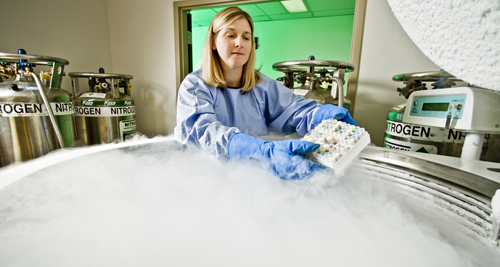Helen F. Graham Cancer Center contributes to landmark breast cancer study within The Cancer Genome Atlas


The Helen F. Graham Cancer is among an elite group of institutions that provided tumor samples for groundbreaking research hailed as the largest, most comprehensive breast cancer genomic study ever. The results that are emerging from this study are redefining our understanding of breast cancer and other cancers, and signal a transformation in future treatments that will benefit a wide range of patients.
Recent discoveries, published in the October issue of Nature, identify four genetically different subtypes of breast cancer, and within those, the genetic drivers of many different types of cancer. Researchers analyzed data from 825 breast tumor samples supplied by the Graham Cancer Center and other cancer centers as part of The Cancer Genome Atlas. They identified at least 40 genetic alterations that could be targeted with anti-cancer drugs, many of which are being developed or already used to treat other cancers with the same mutations.
A surprising finding distinguishes a particularly poor-prognosis breast cancer subtype found in the deep skin layer of basal cells linked to ovarian cancer. This opens up the possibility of routine treatment for ovarian cancer with some commonly available breast cancer drugs.
“The promise of The Cancer Genome Atlas is coming to fruition with unprecedented insights into the biology of cancer,” said Nicholas Petrelli, M.D., Bank of America endowed medical director of the Helen F. Graham Cancer Center. “Our proven tissue procurement capability to match The Cancer Genome Atlas standards enables our contribution to this unprecedented effort to improve cancer therapies.”
Reports from The Cancer Genome Atlas on similar studies of colon and lung cancer, which the Helen F. Graham Cancer Center also participated in, were published in Nature in July and September. They pair colon and rectal tumors as a single type of cancer— not separate as previously thought —and identify potential new anti-cancer drug targets.
The Cancer Genome Atlas, funded by the National Institutes of Health, uses genomic technologies and large-scale gene sequencing to map out an atlas of genetic changes for specific types of cancers, and shares that information publicly with scientists. The Graham Cancer Center is on a short list of tissue-collection centers that includes major universities and leading hospitals such as MD Anderson Cancer Center, Memorial Sloan-Kettering Cancer Center and the Mayo Clinic. The Graham Cancer Center is one of only two National Cancer Institute Community Cancer Centers chosen to participate.
According to Dr. Petrelli, Christiana Care’s Tissue Procurement Center is the result of a highly coordinated effort.
“We recognized almost a decade ago that our ability to collect, preserve and bank biospecimens would constitute an important research resource,” he said. “Our success in building the Tissue Procurement Center was the result of teamwork and cooperation across disciplines that included our Cancer Program research staff, the departments of Pathology and Surgery, as well as operating room staff.
To date, the Tissue Procurement Center has banked about 3,000 human tissue specimens. Since 2009, it has provided some 300 tissue samples to The Cancer Genome Atlas for analysis. According to Tissue Procurement Manager Brenda Rabeno, MLS, MBA, these constitute most of the tumor types The Cancer Genome Atlas accepts.
“We have expanded our initial collection of brain, lung and ovarian tumors to include up to 20 additional tumor types,” Rabeno said.
Cancer patients having surgery at Christiana Hospital who have not had prior chemotherapy or radiation can consent to donate a small sample of their tumor for The Cancer Genome Atlas. Rabeno works with OR and Pathology staff to identify tumors that meet the program’s requirements and collect small samples. Following a rigorous quality-control process, the Tissue Procurement Center freezes the tissue in 1 milliliter vials before shipping them to The Cancer Genome Atlas Biospecimen Core Resource in Ohio for analysis, along with the required documentation, a blood sample and sometimes normal tissue.
“The most exciting aspect of this project is that the genetic secrets unlocked in these small tissue samples are being pooled and shared with scientists whose work has already advanced the progress of cancer research,” Rabeno said.